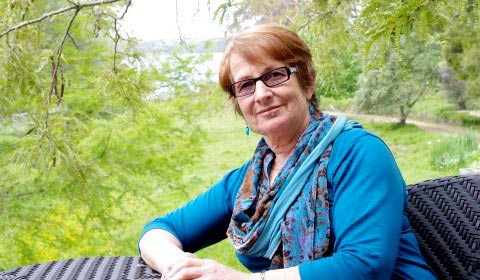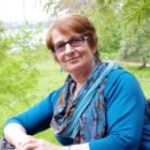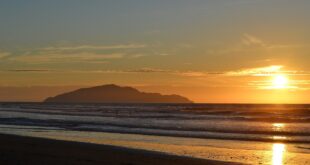Courtesy of My Generation.
In the recent local body elections, Waiheke Islanders turned out to vote by the truckload. And one of the reasons could well be the island’s community newspaper. But as VICKI JAYNE reports, heading up Waiheke’s long-running Gulf News is far from an easy ride.

It’s Thursday morning and Gulf News editor Liz Waters is on a bit of a high. The latest issue of Waiheke Island’s weekly paper has been delivered complete with – “ta-daaa” – the first of the summer season’s Weekender tucked inside. And it’s looking good.
Turning its pages is like opening a portal into community life – from art awards to yogalates, politics to poetry, schools and sports events, walks and wine – all book-ended by those oh-so-useful sales and services bits and, of course, island opinion.
Opinion! This being Waiheke, there’s lots of it. Dealing with the letter deluge is part of the editor’s weekly balancing act – a dance on the rather unforgiving highwire of public scrutiny. Cut too many words or even, God forbid, fail to publish a Waiheke Islander’s often overly florid rant on whatever is topic-du-jour is just asking for a dressing down – most likely delivered in the local supermarket.
“This job comes with a level of accountability that politicians don’t have – that daily newspaper editors don’t have,” says Liz wryly. “It’s that ‘in-the-supermarket’ accountability – you literally can’t go out without someone bailing you up about something you did or didn’t print this week, or whether you mis-spelt a name. These are things that matter to people.”
And it matters to Liz. After 30 years of involvement with community newspapers, she still hasn’t developed a thick skin.
“I think it would be quite good if I could – but actually it matters to me that the paper is not always as good as we all want it to be. It matters to me personally if we get things wrong – and it can also make life in a small community difficult at times.”
There have been a few such times over the years – but it’s only dented rather than destroyed her enthusiasm for the role of community scribe.
“Obviously I believe in community newspapers. I’m on the executive committee of the Community Newspaper Association and one of the highlights of my year is getting together with other people doing the same job from Te Anau north. Our mission is all about empowering the community to be a great place to live, work, raise children…It’s about telling the stories that make people feel good about where they live.
“Whether it’s capturing the spirit of old-timers before they leave or allowing everyone to share and understand the passion of ordinary people doing a whole range of extraordinary things. I can say that in 30 years on Waiheke, there has never not been stories to go in next week’s newspaper. The energy to go out and get them might come up a bit short at times – but the stories are always there.”
Now into her fifth decade of journalism – and first few months of grannydom – Liz Waters has lost none of the passion for print she learned as a 17-year-old cadet reporter. Staying true to Gulf News’ proud heritage of being driven by journalistic endeavour rather than commercial imperative is something she holds dear.
“Yes – that’s important to me. We have a job to do and that is what we owe people and that is what we offer advertisers – a newspaper that is a must-read because it canvasses all those issues that are important to people who live here. And obviously you’re only as good as last week’s issue. It’s quite daunting like that.”
It’s why Thursdays are good. The minor miracle of birthing yet another issue is like the addictive buzz of a good coffee. It’s the reward for working long hours – and the cue for donning mental grapples to start hauling herself up the next mountain of freshly minted words – some 12,000-16,000 of them – every week.
It’s a performance Liz has been repeating since she bought the paper in 1993, although her involvement dates back a lot further.
After learning her trade the old-fashioned way – she was the first girl to snaffle one of two coveted annual cadetships on the New Zealand Herald back in the late 1960s – she found herself doing a mix of everything from court reporting to television reviews.
“The sinking of the Wahine was my first really big newsroom night. I got a very good grounding in journalism that’s held me in great stead for what I’ve done since.”
That included a couple of stints on The Northern Advocate while she and her then partner, David, worked on their dream – building the boat that was to take them on a four-year circumnavigation of the globe. Pendragon still has a special place in her heart.
“She was a gorgeous 42-footer and we managed what was really quite an immaculate circumnavigation in her. There was no drama – we always knew with that boat that if we got the seamanship right then the boat would take care of us. She was also very fast – across the Indian Ocean we did almost 200 miles a day which was practically unheard of in a boat that size. You have to be surfing quite a bit – and we were. It wasn’t ‘roaring 40s’ stuff but there were some great waves.”
Best decision – not heading north to get the boat trucked round the then-closed Suez Canal. “We would have been caught up in the Yom-Kippur war – along with the obvious problems of trucking a 14-tonne boat several hundred miles.”
Four years and a world of experience later, Liz was back in Whangarei – taking a work break to care for the first of three children. Looking for a base to raise a family brought the couple to Waiheke – and selling Pendragon provided the means to buy a 16-acre block in Blackpool that, at the time, was a mess of gorse and blackberry.
“The real estate agent didn’t even want to show it to us – and it was a backbreaking job to clear it, especially on top of running a weekly newspaper.”
That was in 1979. Gulf News, started by Mervyn Dykes six years earlier, was in need of new blood. After arriving on the island, David and Liz bought shares and her long history with the paper began. It was never boring – and joint ownership of a paper provided volatile schooling in group process.
“We had anywhere up to eight or nine shareholders ranging from professional journos to a local millionaire with business nous. A few competing egos. One of my jobs in those early days was shareholding secretary. I think it was the most thankless job I’ve ever done. You’d have to make useful decisions out of some fairly robust conversations…
“This was around the same time that people were trying to make communes work. Trying to run a newspaper on that sort of basis with the strong personalities that a community like Waiheke tends to throw up – well, it sparked a whole fascination with group process and with the nature of leadership.”
Over the next 15 years or so while the paper’s editorship cycled through a series of experienced journos – including Steve Bloxham, David Waters, Tom Frewen, Simon Johnston – Liz filled in wherever she was needed while raising three children. That meant doing everything from writing features to processing photos in a backyard shed.
“One day I had to help fix an AB Dick printer with an eight-inch nail – literally. You were just part of everything…”
Gulf News was then printed and manually collated in a shed that, along with the ‘hand-built’ family home, occupied their rural block. That was until an epic moment in the paper’s history when a short-lived rival newspaper threatened legal action over such commercial activity taking place in a rural zone. The press wasn’t to be stopped, however. Installed on an offshore barge, the AB Dick continued churning out the weekly news for a couple of months until commerical premises were found.
By the late 1980s, most of the paper’s shareholders wanted out – and the paper was sold to Jim Eagles. Liz stayed on for a bit as manager and then decided to start up her own community newspaper in her childhood stamping ground of Devonport.
“By then I knew a bit more about how best to go about it – so I actually designed a mission statement and business plan, and then started The Flagstaff. It went straight to 24 pages, over 6000 circulation, hand delivered – and it’s still running.”
She also helped to establish Otara’s community newspaper and was planning to expand The Flagstaff model to other suburbs to make the business more sustainable when she heard that Gulf News might be back on the market. Months of negotiation later and she was back with Gulf News – this time as sole director.
The 17 years since haven’t slowed her deadline-driven lifestyle or weakened her strong sense of commitment to the job. It hasn’t been easy. The advent of not one but two rival newspapers (the remaining one now owned by media giant Fairfax) made economic sustainability a lot tougher, a venture into the restaurant trade turned sour, and the death of her youngest daughter overseas in 2005 carved an unfillable hole in Liz’s life.
Through it all, the paper keeps performing its weekly minor miracle of arriving on shop counters every Thursday morning. It’s an island institution – a mirror in which the community can see its own richly textured image; a vehicle for expressing its aspirations, its achievements, its joys and its outrage. From endless skirmishes of the developer vs conservationist kind to ructions over rubbish recycling, there’s a lot that locals can get hot under the collar about. And the community newspaper is inevitably at the heart of it – both reflecting and campaigning.
A fierce defender of the island’s right to choose its own destiny, Gulf News has persistently nipped at the trouser legs of big brother bureaucracy since the island lost its autonomy to come under Auckland City jurisdiction in 1989. Despite limited resources, the paper works at getting behind PR bluster to expose real figures and actual intentions. In the latest round of local government centralisation, it helped to ensure Waiheke residents were better informed than most about what the process means to them.
It’s information reflected in voter turnout on the island and highlights what Liz sees as an essential role for community newspapers. “I think the fact that over many years we’ve turned out the most voters says something about the importance of community newspapers in having people able to feel engaged and empowered to respond appropriately to both the good and bad things.”
A journalist who has never mistaken herself for the story, Liz tends to stay in the background and just present the information that allows people to choose their opinions rather than being hand-fed them. “I probably paid the price for that a bit when we got media competition and it became much more of a personality game. I was still relatively invisible.”
A strong believer in social justice – that sense in New Zealand that ‘Jack’s as good as his master’, Liz has inevitably been seen as biased toward particular political viewpoints. But as she notes ruefully, if she’s copping criticism from both ends of the political spectrum, she’s probably steering a fairly true path. But the paper does take a campaigning stance when she feels community interests are being compromised.
For example, Auckland City’s decision to scrap a highly efficient local recycling enterprise in favour of an Australian-based multinational that hasn’t yet met the same standards of resource recovery still rankles.
“They’re grinding up glass for use in roading – when our wine industry is so starved of bottles it’s having to import. That is ridiculous. Yes – I am passionate about this stuff.”
So does that passion keep driving her weekly deadline addiction?
“It’s just what I do. I am passionate about community newspapers. If I could create four more, I’d be even happier. Because I do really believe they create something in communities – the fourth estate concept of checks and balances that I think is profoundly missing in urban life.
“I was made aware again, putting together this issue of Weekender, of just how dynamic this community is. I’m impressed by how well educated, well travelled, well intentioned as a community we are. You know there are something like 168 organisations here – this is people looking after other people. I think, constantly being made aware of such things – that’s the real win.”








Join the Discussion
Type out your comment here:
You must be logged in to post a comment.